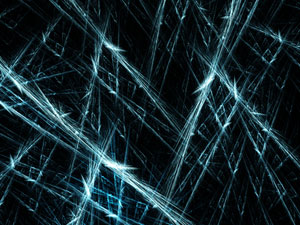

A single query in Google's search bar will give you a long list of websites matching your request, typically in less than a second. That list, however, reflects just a small part of the World Wide Web — just the tip of the digital iceberg. Much of what is on the Internet will not show up in your Google search results because it is not visible or accessible to the average person. That hidden virtual universe is called the Deep Web.
Like the part of the Web we do know, not everything is squeaky clean and rosy in Deep Web territory. In the news, the Deep Web is often referenced in reports about websites that engage in illegal or controversial activities, such as selling drugs and weapons or promoting pedophilia. Being hidden from most people on the Internet has made the Deep Web a haven for such sites, and given birth to a subsection of the Deep Web — one commonly known as the "darknet" or Dark Web.
MORE: 10 Easy-to-Use Security and Privacy Tools
The two terms have often been used synonymously, but the Dark Web and the Deep Web have distinct identities of their own.
"While Deep Web represents the part of the Internet not indexed by common search engines, the Dark Web is composed by computing systems or computer networks, exposed on the Internet that can no longer be accessed through conventional means," said Pierluigi Paganini, a cybersecurity expert and founder of the SecurityAffairs blog.
Perhaps the most popular example of a Dark Web site, or "hidden service," is Silk Road, a billion-dollar (according to prosecutors) online black market for drugs that was shut down in 2013, after the FBI arrested its founder Ross Ulbricht. In February 2015, Ulbricht was convicted on seven drug and conspiracy counts, but that didn't stop drug trafficking on the Dark Web. People's Drug Store, a website that offers any hardcore drug you can think of, is still accessible and calls itself "The Darkweb's Best Drug Supplier."
How the Dark Web Works
Sign up to get the BEST of Tom's Guide direct to your inbox.
Get instant access to breaking news, the hottest reviews, great deals and helpful tips.
Most websites on the Dark Web are intentionally hidden and can be accessed only with certain software packages, the best known of which are Tor and The Invisible Internet Project (I2P). Tor is a network protocol and framework based on a project developed in the mid-1990s by the U.S. Naval Research Laboratory in order to protect American intelligence communications online. I2P is similar, but has been developed without government input.
Both these tools help users protect their communications on the Internet, giving them the ability to remain untracked and unidentified while accessing the Dark Web. Tor, for example, encrypts data multiple times while it is in transit through various "nodes" on the Tor network (although the data may not be encrypted once it leaves the Tor network and re-enters the open Internet).
Nodes are computers on the Tor network that relay traffic from one point to another, removing and replacing address information at each stage. This makes it difficult for an eavesdropper to identify where the information is coming from and for whom it is meant.
"The most popular content that resides on the Dark Web is found in the Tor network," Paganini said. Many popular links found in the Deep Web use ".onion" URLs which are accessible only through the Tor Browser; I2P links use the ".i2p" suffix.
'Dark' Debate
Many pro-privacy groups are not fans of the term Dark Web.
"Use of the word 'dark' towards an actual technology like Tor Hidden Services creates a default, inherent negative bias towards that technology as something that is bad, nefarious, ill-willed, along the lines of the 'dark side' or 'black magic,' and so on," said Nathan Freitas, founder of The Guardian Project, a New York-based effort to provide free mobile privacy tools for all.
Hidden services are currently used by many activists and journalists, particularly those living in countries with oppressive regimes, including China, North Korea and Iran.
According to the Tor blog, the Dark Web and its hidden services are often used by non-governmental organizations to securely receive information on government corruption and injustice from concerned citizens. They are also used by people looking for the latest cat facts (view with Tor), companies that want to secure the path of their clients or by people chatting securely and anonymously.
"The 'positive side of the Dark Web' is really quite huge," Freitas said. "It goes beyond just journalists and whistleblowers, and potentially to every person in the world, that wants to connect to some other person or device and share information without the fact that these two people are connecting or sharing information [being] monitored, logged, indexed or intercepted."
Government Challenges
The documents Edward Snowden gave journalists in June 2013 showcased the National Security Agency's efforts to monitor the Internet.
"One of the documents Snowden leaked revealed a project codenamed 'Tor Stinks,' which is the NSA's efforts at developing the capability to de-anonymize a small fraction of Tor users manually," Paganini said.
Governments worldwide are trying to do the same. In 2014, the Russian government publicly announced a war on Tor users by offering $111,000 for a technology that would help it identify them.
"The anonymity offered by networks like Tor represents a serious obstacle for the monitoring activities run by any government," Paganini said. "[The Dark Web] provides the necessary instruments to avoid censorship of governments and allows people like journalists operating in risky areas to communicate with other countries, despite the monitoring operated by some regimes."
The Dark Web may not be for everyone. But as is the case with any online service, the more informed you are about its pros and cons, the better it will work for the purposes you need. There is no debating that the Dark Web gives you the power to be in control of your digital footprint, and gives you independence on several levels — including the choice to simply stick to the Web everyone knows.
- Best Cloud Backup Services
- Why It's So Hard for the CIA to Hack Your iPhone
- Blackphone Review: All-Encompassing Security
Follow us @tomsguide, on Facebook and on Google+.
Mir Ubaid is a contributing writer at Tom's Guide. He reports on the intersection of cybersecurity, privacy and public policy. His stories have also appeared on Al Jazeera English and Reuters. When he's not working, Mir spends too much time playing Counter Strike, where he's been perpetually stuck at rank Gold Nova 4 for the last five years.
